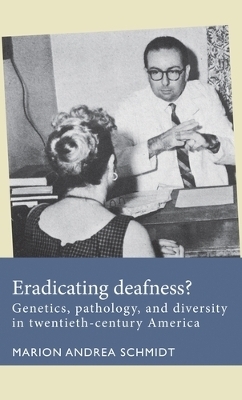
Eradicating Deafness?
Genetics, Pathology, and Diversity in Twentieth-Century America
Seiten
2020
Manchester University Press (Verlag)
978-1-5261-3817-0 (ISBN)
Manchester University Press (Verlag)
978-1-5261-3817-0 (ISBN)
How did American geneticists go from fearing the dysgenic effects of deaf intermarriage to considering modern biotechnology a threat for Deaf culture? This book provides insight into changing ideas of what deafness is, what science and medicine should achieve, and to the transformative effect of exchange between scientists and deaf communities. -- .
Is deafness a disability to be prevented or the uniting trait of a cultural community to be preserved? Combining the history of eugenics and genetics with deaf and disability history, this book traces how American heredity researchers moved from trying to eradicate deafness to embracing it as a valuable cultural diversity. It looks at how deafness came to be seen as a hereditary phenomenon at all, how eugenics became part of progressive reform at schools for the deaf, and how, from the 1950s on, more sociocultural approaches to disability and minority led to new cooperative projects between professionals and local signing deaf communities. Analysing the transformative effects of exchange between researchers and objects of research, this book offers new insight to changing ideas about medical ethics, reproductive rights, the meaning of scientific progress and cultural diversity. -- .
Is deafness a disability to be prevented or the uniting trait of a cultural community to be preserved? Combining the history of eugenics and genetics with deaf and disability history, this book traces how American heredity researchers moved from trying to eradicate deafness to embracing it as a valuable cultural diversity. It looks at how deafness came to be seen as a hereditary phenomenon at all, how eugenics became part of progressive reform at schools for the deaf, and how, from the 1950s on, more sociocultural approaches to disability and minority led to new cooperative projects between professionals and local signing deaf communities. Analysing the transformative effects of exchange between researchers and objects of research, this book offers new insight to changing ideas about medical ethics, reproductive rights, the meaning of scientific progress and cultural diversity. -- .
Marion Andrea Schmidt is a Research Associate at the Department of Medical Ethics and History of Medicine at the University Medical Center Göttingen -- .
Introduction: of races and genocides
1 The sciences of deafness: deaf people as objects of research, reform, and eugenics, 1900–1940
2 Concerned and puzzled: heredity research and counselling at the Clarke School, 1930–1960
3 Minorities and pathologies: psychogenetic counselling at the New York State Psychiatric Institute, 1955–1969
4 Preventing tragedy, negotiating normalcy: the changing meaning of Usher syndrome 1960–1980
5 Signing risk and chance: collaborating for culturally sensitive counselling, 1970–1990
Conclusion: from Bell to biodiversity
Bibliography
Index -- .
| Erscheinungsdatum | 10.05.2021 |
|---|---|
| Reihe/Serie | Disability History |
| Zusatzinfo | 6 black & white illustrations |
| Verlagsort | Manchester |
| Sprache | englisch |
| Maße | 138 x 216 mm |
| Gewicht | 399 g |
| Themenwelt | Geschichte ► Allgemeine Geschichte ► Neuzeit (bis 1918) |
| Studium ► Querschnittsbereiche ► Geschichte / Ethik der Medizin | |
| Sozialwissenschaften ► Soziologie | |
| ISBN-10 | 1-5261-3817-4 / 1526138174 |
| ISBN-13 | 978-1-5261-3817-0 / 9781526138170 |
| Zustand | Neuware |
| Informationen gemäß Produktsicherheitsverordnung (GPSR) | |
| Haben Sie eine Frage zum Produkt? |
Mehr entdecken
aus dem Bereich
aus dem Bereich
Giordano Bruno - ein ketzerisches Leben
Buch | Hardcover (2024)
C.H.Beck (Verlag)
29,90 €
das dramatische 16. Jahrhundert
Buch | Hardcover (2024)
Rowohlt Berlin (Verlag)
34,00 €
die Fahrt der Bounty und die globale Wirtschaft im 18. Jahrhundert
Buch | Hardcover (2024)
Klett-Cotta (Verlag)
25,00 €


